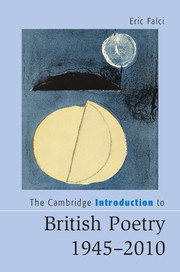Book contents
- Frontmatter
- Contents
- Acknowledgments
- Introduction
- Chapter 1 The Movement and Its Discontents
- Chapter 2 Decolonizing Poetry
- Chapter 3 Local Modernism
- Chapter 4 Late Modernism
- Chapter 5 The North
- Chapter 6 New Narratives
- Chapter 7 Platforms and Performances
- Conclusion: Archipelagic Experiments
- Notes
- Further Reading
- Index
- Cambridge Introductions to Literature
Chapter 6 - New Narratives
Published online by Cambridge University Press: 05 November 2015
- Frontmatter
- Contents
- Acknowledgments
- Introduction
- Chapter 1 The Movement and Its Discontents
- Chapter 2 Decolonizing Poetry
- Chapter 3 Local Modernism
- Chapter 4 Late Modernism
- Chapter 5 The North
- Chapter 6 New Narratives
- Chapter 7 Platforms and Performances
- Conclusion: Archipelagic Experiments
- Notes
- Further Reading
- Index
- Cambridge Introductions to Literature
Summary
Considering the cumulative energies of the British Poetry Revival and the Northern Irish Renaissance, poetry in the United Kingdom from the mid-1960s through the 1970s was at a zenith. All the more surprising, then, that Blake Morrison and Andrew Motion describe the two decades prior to the publication of their 1982 anthology, The Penguin Book of Contemporary British Poetry, as a “spell of lethargy.” To be fair, when Morrison and Motion state that “very little – in England at any rate – seemed to be happening” for “much of the 1960s and 70s,” their geographical disclaimer recognizes the intense poetic activity in Northern Ireland. Indeed, one thing that Morrison and Motion get right in their presentation of contemporary British poetry is the centrality of the Northern Irish poets within the late-twentieth-century Anglophone canon. Heaney is quite consciously placed as the anthology's presiding figure, and Longley, Mahon, Paulin, Muldoon, and McGuckian are given substantial room. Of the three narratives that the anthology espouses, its focus on Northern Irish poetry has proved to be the most durable.
The other two central suggestions that they make about the poetry they collect – and, implicitly, about the mainstream of British poetry at the time – have had various degrees of traction. They are right to say that their poets turn away from a focus on the personal or empirical (as in, respectively, Alvarez's and Conquest's versions of postwar poetry) and embrace “ludic and literary self-consciousness” and “metaphor and poetic bizzarrerie,” but this claim is at once somewhat too broad and much too thin, even if one puts aside for the moment the large body of important work from the 1970s and 1980s that is quite directly autobiographical. Isolating the poets included in their anthology as unique exemplars of a self-conscious, metaphorically rich poetry misconstrues the previous generations of poets against whom Motion and Morrison set their selection. The most notable purveyors of “poetic bizzarrerie” in the volume are the Martian poets – Craig Raine and Christopher Reid primarily – and Motion and Morrison's emphasis on the period's notable inventiveness is weakened by having to rest upon this limited vein of work.
- Type
- Chapter
- Information
- The Cambridge Introduction to British Poetry, 1945–2010 , pp. 155 - 180Publisher: Cambridge University PressPrint publication year: 2015

